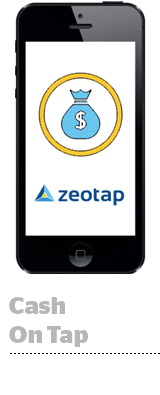
Zeotap is banking on 2017 being the year that telcos make their impact on the advertising world.
The mobile data platform and telco data onboarder revealed its $12.7 million Series B (12 million euros) on Tuesday, bringing its total funding to $20 million. Zeotap, whose clients include a number of the top carriers in India, raised $1.3 million in seed cash in 2014 and a $6 million Series A the following year.
The round was led by New Science Ventures, with pinch-hitting from Capnamic Ventures, Iris Capital and map data company Here.
At the Consumer Electronics Show in Vegas earlier this month, Zeotap co-founder and Chief Product Officer Projjol Banerjea met with a number of telcos and marketers that are “diving headfirst” into the opportunity around first-party data monetization.
“This is the year that carriers are planning for it on their P&Ls,” Banerjea said. “They vary in maturity and size, but they’ve got buy-in from their bosses and they’ve allocated headcount. It’s all coming together.”
Zeotap’s tech allows carriers to translate their subscriber data into something that’s usable by other digital advertising platforms by matching user info with mobile identifiers.
The PII is removed and replaced with anonymous IDs that, for consumer privacy and protection reasons, expire after 48 to 72 hours. Zeotap is also certified for the General Data Protection Regulation set to take hold in the EU come May 2018.
Data security is one of the platform’s major value props, both from a consumer perspective and a business perspective, said Mark Grether, former COO of GroupM trading desk Xaxis and a Zeotap investor.
“Never share data directly,” he said. “The moment it’s out in the market, it’s uncontrollable and loses its value.”
Although telco data is its bread and butter, Zeotap recently started adding other data sets to its stockpile through partnerships with navigation and weather companies for location data, and with security, utility and anti-virus companies for first-party behavioral data.
Those data sets are being layered on top of telco data to enrich the segments that a carrier and its advertising partners can use for targeting.
Mediamond, which sells advertising for Mediaset, Italy’s largest broadcaster, and Mondadori, Italy’s most prominent publisher, uses Zeotap to weave deterministic data into campaigns for its clients, including P&G.
“Telecom data is quality, reliable data,” said Mara Negri, Mediamond’s director of partnerships. “We’re quite new users of this data and we’ve only done it for between 10 and 20 companies so far, but we know there is potential there and that this number will increase rapidly as our sales force starts pushing it this year.”
Publicis agency Zenith España recently used Zeotap for its client Mercedes-Benz to target high-income males ages 40-60. The primary targeting signal was how much money they were spending on their monthly mobile plan, which was one indicator of whether they’d be able to afford a luxury vehicle.
“We’ve had success with them for campaigns targeting niche audiences,” said Stephen Dugan, director of programmatic at Publicis Media Spain. “The industry has been plagued by a need for robust, actionable targeting data, especially in the mobile landscape, and it’s going to be more and more interesting as we’re able to add location to that and target people within a certain radius around a particular venue.”
Zeotap is planning to sink the majority of its fresh funding into hiring engineers and data scientists, bringing its headcount from 45 to around 70 by the middle of the year. The company, which has its headquarters in Berlin and an office in Bangalore, will also invest in expanding its US footprint through a New York outpost manned by Zeotap co-founder Daniel Heer, who’s in the process of relocating from Germany.
When Zeotap was founded in 2014, the only major example of a telco buying ad tech was Singtel’s $321 million acquisition of mobile ad network Amobee in 2012. By 2016, Verizon had bought AOL for $4.4 billion and Telenor had snagged Tapad for $360 million.
But that doesn’t mean Zeotap itself is an acquisition target for telcos looking to bring ad tech on board, Banerjea said. It’s aiming to take advantage of the telco-loves-ad-tech trend without actually getting bought up itself.
“The virtue of our platform is that it’s agnostic, the neutral arbiter for telecom data within a market,” he said. “Our value in the market comes from being nonaligned, and we would like to keep it that way.”
This post was syndicated from Ad Exchanger.

More Stories
EXCLUSIVE: Most Americans Don’t Care If TikTok Shuts Down
Trump Grants TikTok a Second 75-Day Extension, Pushing Deadline to Mid-June
Reinventing Retail for Gen Z: Stacy Doren’s Vision for Journeys